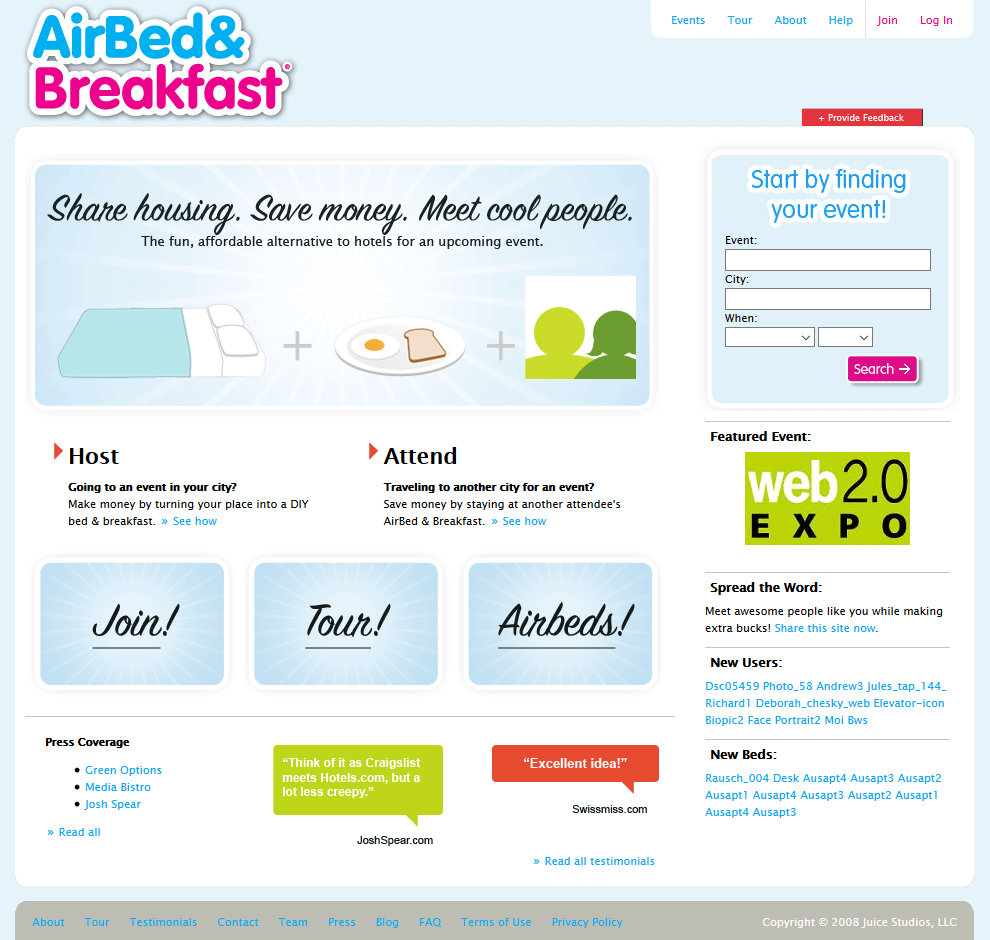If you’re an Airbnb host, considering becoming one, or thinking about entering the short-term rental industry in any capacity, understanding the meaning of Airbnb is crucial to achieving success. While many people associate Airbnb with booking unique, affordable accommodations, the platform is much more than that. From its humble beginnings as a temporary lodging solution for conference attendees to becoming a multi-billion-dollar company, Airbnb has dramatically transformed the travel and hospitality industry.
So, what is Airbnb, why is it called Airbnb, how does Airbnb work, and what does Airbnb stand for? More importantly, why is this knowledge vital for hosts? In this article, we’ll dive into these questions to help you make better-informed decisions and ultimately boost your income as an Airbnb host.
As a professional Airbnb host, it’s essential to stay well-informed about the evolving industry trends. Additionally, using the right tools can be incredibly beneficial.
Hostex can help you seamlessly manage all your listings across multiple OTAs, its automation tools taking care of over 70% of your daily tasks, giving you more time to focus on what really matters. Plans start as low as $4.90 per month.

Airbnb Meaning: What Does Airbnb Stand For?
Airbnb’s journey began in 2007 when its founders, Brian Chesky, Joe Gebbia, and Nathan Blecharczyk, came up with a creative solution to an overbooked design conference in San Francisco. With no affordable accommodation options left, they decided to offer attendees a place to sleep by turning their living room into a temporary bed and breakfast. This idea set the stage for what would soon become one of the biggest disruptions in the hospitality industry.
The Origins of Airbnb: Why Is It Called Airbnb
At its core, Airbnb was born out of necessity. The name itself originates from the original concept: “Air Bed and Breakfast.” The “air” referred to the air mattresses the founders provided as makeshift beds for conference-goers.
At the time, it was a simple and affordable solution to a common travel problem: finding a place to stay in an overbooked city. However, as word spread and demand grew, the idea quickly evolved beyond a one-time experiment.
Over the next few years, Airbnb transformed from a small-scale platform for local events into a global marketplace for travelers and hosts alike. While Air Bed and Breakfast was a perfect fit for its initial business model, it soon became clear that the brand needed a more universal identity.
In 2009, the company shortened its name to simply Airbnb, reflecting a shift towards a broader, more scalable platform. This new name not only eliminated the reference to the air mattress but also highlighted the broader concept of short-term rental opportunities, far beyond just temporary beds or breakfasts.
Airbnb symbolizes much more than a place to rest your head. It represents a community-driven platform, a new way of thinking about travel, hospitality, and community. It captures the company’s mission to offer more than just a bed; Airbnb provides experiences, connecting hosts and guests from around the world.

The Meaning of Airbnb in Today’s Market
In the ever-evolving landscape of the travel and hospitality industry, Airbnb has grown far beyond its original concept of offering short-term accommodations. Today, Airbnb’s meaning reflects a broader and more complex role within the global marketplace, transforming the way people travel, experience new destinations, and even engage with local cultures.
Airbnb’s New Identity: Beyond Accommodation
Airbnb originally began as a platform for booking budget-friendly, shared accommodations, aiming to address the high costs and impersonal service commonly associated with traditional hotels. However, over time, it has evolved significantly. This shift is evident in the expansion of its offerings, such as Airbnb Experiences and Airbnb Services.
Now, travelers can not only book a place to stay but also reserve a variety of activities to enhance their trips. These activities range from outdoor adventures like hiking and surfing lessons to cultural experiences such as art classes and wine tastings.
This all-encompassing approach fundamentally redefines the concept of “Travel like a local“, offering travelers authentic, hands-on interactions with local cultures, rather than simply securing a place to sleep. It’s a complete shift in how people experience a destination, emphasizing personal connection and immersive adventure, beyond just finding accommodation.
Airbnb’s Social Impact: Shaping Modern Travel Culture
The impact of Airbnb on the travel and lodging industry is undeniable. In today’s market, it has reshaped the way people think about both travel and accommodation. Traditional hotels, once the dominant option for travelers, are now often considered less attractive due to Airbnb’s personalized service, flexibility, and variety of options.
For individual hosts, Airbnb has created new income streams and business opportunities. Homeowners and property investors can now share their spaces with guests from around the world, turning unused rooms into lucrative rental properties. This has made short-term rentals more accessible to a wide range of people, democratizing the investment process and allowing those with limited financial means to enter the real estate market. For many, Airbnb has become a sustainable side hustle or even a full-time business.
For small-scale property investors, Airbnb has introduced a model of ownership that values location and experience over traditional hotel amenities. It allows investors to tap into niche markets, offering unique stays that can attract higher nightly rates. Properties like treehouses, tiny homes, or even refurbished shipping containers are gaining popularity, proving that the market for creative spaces is thriving.
Moreover, Airbnb has fostered a shift in consumer behavior. Travelers today value authenticity and local experiences over cookie-cutter hotel chains. They are more inclined to book a home that reflects the culture of the area, rather than a standard hotel room. This has not only boosted Airbnb’s popularity but has also created a demand for personalized travel. People now seek experiential stays—whether it’s a loft in downtown New York City or a beachside cottage in Bali—that provide them with a deeper connection to the destination.
Airbnb as the Heart of the Sharing Economy
At its core, Airbnb is a key player in the sharing economy. What sets it apart from traditional forms of accommodation is its decentralized, flexible, and personalized nature. Unlike hotels, which are often centrally managed and standardized, Airbnb relies on individuals (hosts) to offer unique accommodations in a wide range of settings. This peer-to-peer model allows travelers to access spaces that reflect the local culture and personality of the host, adding an element of individuality and community that traditional hotels simply cannot match.
This flexibility extends to both hosts and guests. For hosts, Airbnb provides a platform to rent out their homes or rooms on their own terms, choosing when and how often to host guests. Guests, in turn, benefit from this flexibility by having access to a variety of options at different price points. Whether they are looking for a budget-friendly room or a luxurious villa, Airbnb accommodates a broad spectrum of preferences and budgets.
Furthermore, Airbnb contributes to the rise of local tourism. By allowing travelers to stay in residential neighborhoods, rather than in touristy districts dominated by hotels, Airbnb promotes the dispersal of tourism to areas that may not traditionally attract large crowds. This not only benefits local businesses but also reduces the pressure on over-touristed regions.

The Future of Airbnb: Trends Every Host Should Watch
As the short-term rental industry continues to evolve, Airbnb is no exception. In the coming years, we can expect significant shifts, driven by technological advancements and changing market demands. For hosts, staying ahead of these trends is crucial to maintaining a competitive edge.
1. Emerging Trends: Technology and Market Shifts
In recent years, technology has played an increasingly important role in reshaping the Airbnb landscape. We’re seeing the rise of automation tools, artificial intelligence (AI), and data analytics that promise to make property management easier and more efficient. Automated pricing models, for instance, will help hosts maximize their earnings by adjusting rates based on demand, location, and seasonality. Additionally, AI-driven recommendations will offer guests personalized suggestions, making it easier for hosts to target the right clientele.
Market trends also point towards a greater emphasis on personalization. Travelers are seeking unique, tailored experiences that go beyond just a place to stay. This is where the integration of “Airbnb Experiences” and “Airbnb Services” comes in, allowing hosts to offer more than just accommodation. Whether it’s a cooking class, a guided tour, or a private art session, these personalized experiences will become a critical part of Airbnb’s future growth. As the market moves toward increasingly customized offerings, hosts will need to adapt their listings to meet the changing demands of the modern traveler.
2. Adapting to Change: Staying Competitive on Airbnb
For hosts, the key to staying competitive in the ever-evolving Airbnb ecosystem is adaptability. One way to do this is by embracing technological innovations that streamline daily tasks, such as automated guest communication, cleaning services, and price optimization tools. Investing in smart home technologies, such as keyless entry and smart thermostats, can also improve the guest experience while making operations more efficient.
In addition to technological upgrades, hosts will need to stay informed about changing regulations in their city or region. Cities worldwide are increasingly implementing stricter rules for short-term rentals, and being proactive about compliance will help you avoid penalties and stay operational. The ability to navigate the regulatory landscape is becoming as important as the guest experience itself.
3. Diversifying Income Streams: Beyond Just Renting Your Property
One of the most exciting aspects of Airbnb’s future is the opportunity for hosts to diversify their income streams. Beyond simply renting out a room or property, hosts can tap into the growing demand for “Airbnb Experiences” and “Airbnb Services.” These offerings allow you to earn money by providing unique, local experiences, like leading city tours, offering cooking classes, or organizing outdoor activities like hiking or surfing.
Additionally, Airbnb is also expanding its services to include things like cleaning, laundry, and even grocery delivery. By integrating these services into your listing, you can offer guests a more seamless and personalized stay while increasing your income potential. This shift represents a key opportunity for hosts to build a more sustainable and profitable business, ensuring that Airbnb remains a valuable income source well into the future.

Final Thoughts: Why Understanding Airbnb Meaning Matters
For Airbnb hosts, understanding the Airbnb meaning isn’t just about knowing its origin or business model; it’s about aligning with its evolution to optimize long-term success.
Airbnb’s transformation has reshaped the short-term rental landscape. The core of this evolution is the platform’s commitment to community, personalization, and flexibility. Hosts who grasp these values are better positioned to leverage Airbnb’s growth, adapt to changes, and ultimately maximize their income.
Airbnb’s Impact on Short-Term Rental Investing
Airbnb has revolutionized the short-term rental industry by empowering individuals to monetize their spaces and diversify their income streams. But the impact goes beyond just offering a place to stay. Today, Airbnb hosts can tap into a broader market by offering unique experiences and services, enhancing the value of their properties.
The platform’s shift toward personalized stays and immersive local experiences creates an opportunity for hosts to stand out. Those who recognize the changing needs of travelers—from seeking more authentic stays to engaging in cultural activities—can adapt their listings and services to meet these demands, increasing both bookings and revenue.
Actionable Strategies for Hosts
The key to success as an Airbnb host is not just understanding the platform’s evolution but also applying that knowledge to enhance your own business. Optimizing your listing, offering tailored guest experiences, and utilizing Airbnb’s expanded features like “Airbnb Experiences” can significantly impact your bottom line.
For instance, consider how you can integrate local activities or personalized services that align with the growing demand for unique travel experiences. Moreover, staying ahead of market trends—such as the increasing demand for eco-friendly and socially responsible options—will ensure your listing remains relevant and attractive to guests.
To sum up, understanding the true meaning of Airbnb allows you to stay agile, make informed decisions, and continually refine your hosting approach. The future of short-term rental investing lies in a host’s ability to adapt, innovate, and respond to evolving traveler expectations. By doing so, you’ll not only sustain but also grow your business in the competitive Airbnb ecosystem.

FAQs about Airbnb
Is Owning an Airbnb Still Profitable?
The profitability of owning an Airbnb property depends on factors like location, market demand, and property management. However, with the right strategy, owning an Airbnb can be highly lucrative. To understand more about the potential profitability, check out this guide on Airbnb profitability.
How to Start an Airbnb?
Starting an Airbnb is a relatively simple process, but it requires proper planning and understanding of the platform’s requirements. To get started, follow this step-by-step guide to starting an Airbnb.
What Are the Requirements to Become an Airbnb Host?
Becoming an Airbnb host doesn’t require much beyond having a space to rent out, but certain regulations and guidelines must be followed. Learn more about what it takes to become an Airbnb host by reading this article on Airbnb host requirements.
How to Make Your Airbnb Stand Out from the Competition?
With so many listings on Airbnb, standing out can be a challenge. However, there are proven strategies to increase visibility and bookings. Find out how to make your Airbnb unique and attractive in this guide to making your Airbnb stand out.
How to Make Money on Airbnb Without Owning a Property?
You don’t need to own a property to make money on Airbnb. There are several ways to generate income, from managing other people’s listings to offering Airbnb experiences. Explore this guide on making money on Airbnb without owning a property.
What’s the Difference Between Vrbo and Airbnb?
Vrbo and Airbnb are two major players in the short-term rental market, but they operate in slightly different ways. To understand the key differences between the two platforms, check out this comparison between Vrbo and Airbnb.
How to Manage Your Airbnb Property Efficiently?
Managing an Airbnb property involves a variety of tasks, from handling guest communications to setting pricing strategies. To learn the best practices for managing your Airbnb efficiently, refer to this guide on Airbnb property management.



